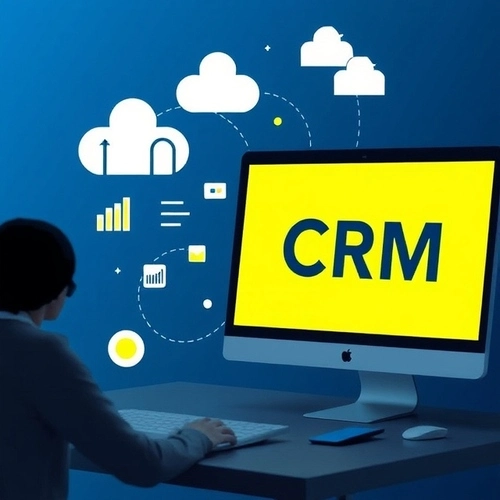Hello, recruiters! Happy to have you back for another edition of Recruiter Digest. Today, we’re tackling a topic that’s been buzzing in the HR world – the future of recruitment. There is a common challenge many of us face in the hiring world, the struggle to effectively manage candidate relationships. It’s a scenario we’ve all encountered at some point – a flood of resumes filling up your inbox, interviews lining up on your calendar, and the exhausting task of maintaining meaningful connections with each prospective hire. However, there is a tool that can simplify your workflow, enhance candidate engagement, and help you manage all candidates at once, and the tool is Customer Relationship Management (CRM) software. It’s a game-changer that many recruiters are already using to streamline their approach to recruitment. In this week’s newsletter, we’ll explore CRM software and learn how this technology is reshaping our industry. Let’s Start!
What is CRM software?
CRM software is a powerful tool used across various industries to manage interactions with customers and potential customers. In the field of recruitment, CRM software is used with the same purpose, but with a focus on managing relationships with candidates throughout the hiring process. At its core, CRM software in recruitment is designed to centralize candidate data, streamline communication, and enhance engagement. It allows recruiters to store candidate information, track their interactions, and nurture relationships over time. Think of it as a virtual database that keeps track of every touchpoint with candidates, from initial contact to final hiring decision.
In other words, CRM software enables recruiters to stay organized, stay connected, and stay on top of their recruitment efforts. It empowers them to manage large candidate pools efficiently, adapt their communication to individual candidates, and ultimately, make more informed hiring decisions.
What are the Features of Recruitment CRM Software?
Recruitment CRM software comes packed with a range of features designed to streamline the hiring process and enhance candidate engagement. Let’s explore some of the key features:
1. Candidate Database Management:
CRM software allows recruiters to maintain a centralized database of candidate information, including resumes, contact details, and interaction history. This makes it easy to search for and retrieve candidate profiles when needed.
2. Communication Tools:
CRM software typically includes communication tools such as email integration, SMS messaging, and automated responses. This enables recruiters to stay in touch with candidates throughout the recruitment process, sending personalized messages and updates.
3. Talent Pipeline Management:
With CRM software, recruiters can effectively manage their talent pipelines by categorizing candidates based on their stage in the hiring process. This allows for better organization and prioritization of candidates.
4. Candidate Relationship Management:
CRM software enables recruiters to nurture relationships with candidates over time. This includes tracking interactions, setting reminders for follow-ups, and sending targeted communications to keep candidates engaged.
5. Analytics and Reporting:
CRM software provides insights into recruitment metrics such as candidate sourcing, time-to-fill, and conversion rates. This allows recruiters to track their performance, identify areas for improvement, and make data-driven decisions.
6. Integration Capabilities:
Many CRM software solutions offer integration with other HR systems, such as applicant tracking systems (ATS) and onboarding platforms. This seamless integration allows for the exchange of data between systems, reducing duplication of effort and improving efficiency.
7. Mobile Accessibility:
Modern CRM software often includes mobile applications or responsive web interfaces, allowing recruiters to access candidate information and perform tasks on the go.
These are just a few of the many features offered by recruitment CRM software, and a good recruitment CRM software offers you much more along with the above features.
How to Find the Best Recruitment CRM Software?
Finding the best recruitment CRM software requires careful consideration of several key factors. First and foremost, assess your specific needs and objectives. Consider factors such as the size of your team, your budget, and the complexity of your hiring process. Next, research different CRM software options and compare their features, pricing plans, and customer reviews. Look for a solution that offers robust functionality, an intuitive user interface, and excellent customer support. Finally, consider scalability and integration capabilities to ensure the software can grow with your business and integrate seamlessly with your existing systems.
In addition to exploring third-party CRM software options, consider the upcoming offering from The Hire Arc. We are thrilled to announce that we will soon be providing our clients with the best and most customized CRM tool designed specifically to boost efficiency in recruitment processes.
Things to Look for in Recruitment CRM
When searching for the ideal recruitment CRM software, several essential features and capabilities can significantly impact your recruitment process’s efficiency and effectiveness. Here are some key factors to consider:
- Customization Options: Look for a CRM tool that offers customization options to tailor the system to your specific recruitment workflows and requirements. Customizable fields, workflows, and reporting features enable you to adapt the CRM to your unique needs.
- Integration Capabilities: Ensure that the CRM tool seamlessly integrates with other recruitment tools and systems, such as applicant tracking systems (ATS), job boards, and HRIS (Human Resource Information Systems). Integration capabilities facilitate data exchange and streamline workflows across different platforms.
- User-Friendly Interface: Ease of use is crucial for user adoption and productivity. Choose a CRM tool with an intuitive user interface and straightforward navigation to ensure that recruiters can quickly learn and utilize the system effectively.
- Customer Support: Consider the level of customer support offered by the CRM vendor. Look for a provider that offers responsive support services, including technical assistance, training resources, and ongoing guidance, to help you maximize the value of the CRM tool.
- Scalability: Assess the scalability of the CRM tool to ensure it can accommodate your organization’s growth and evolving recruitment needs. Look for a solution that can scale with your business and adapt to changes in your recruitment processes over time.
- Pricing Structure: Evaluate the pricing structure of the CRM tool to ensure it aligns with your budget and offers good value for money. Consider factors such as subscription fees, implementation costs, and any additional charges for extra features or user licenses.
- Reputation and Reviews: Research the reputation of the CRM vendor and read reviews from other users to gauge their satisfaction with the product and support services. Look for a reputable vendor with a track record of delivering reliable CRM solutions and excellent customer experiences.
Wrap Up
Recruiters, as we wrap up this edition of Recruiter Digest, let’s reflect on the journey we’ve explored in this blog of CRM software potential in recruitment. We’ve talked about the crucial factors to consider when selecting the perfect CRM tool for your organization, highlighting the importance of customization, integration, user-friendliness, customer support, scalability, pricing, and reputation.
The power of CRM technology can streamline your HR processes, engage candidates effectively, and elevate your recruitment strategies. Stay tuned with us, as in next week’s blog, we will talk about the significance of Video-Interviewing software. Subscribe to our newsletter to stay updated on the latest insights and developments in the world of recruitment!




